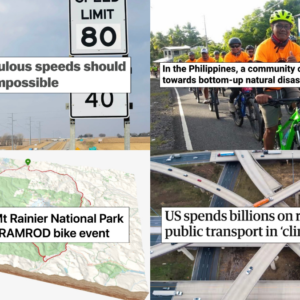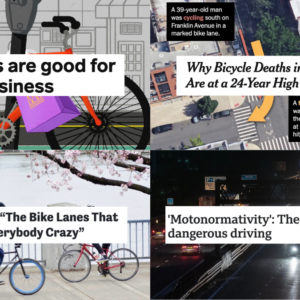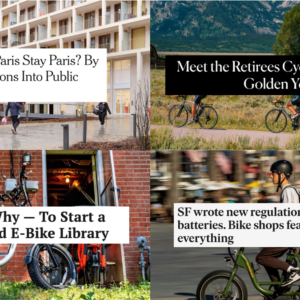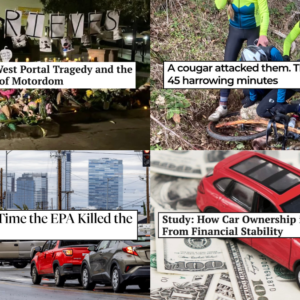Happy Monday friends. Hope you enjoyed the weekend and that you can still feel the sun on your skin. I’m eager to get started on the week and I can’t wait to see everyone Wednesday night at the Bike Happy Hour Anniversary Party. I’ll kick things off by sharing the best stories we’ve collected in the past seven days.
I also want to shout out all the BP readers who send me Monday Roundup suggestions. It’s very helpful. Thank you.
Dog power: It takes a very cute little pup to humanize a bicycle rider in lycra — and to transform drivers into respectful, caring human beings. (The Guardian)
Drive-through cities: I’m glad Portland has relatively few drive-throughs, but after reading this article about how terrible they are it validates my inclination to fight against the ones we have and support an even stronger ban on them going forward. (Vox)
E-scooter lessons: City staffers should have learned a lot by now about how to get the most transportation and environmental bang for their buck from shared e-scooter programs. But if they haven’t, this article should be required reading. (Grist)
The enforcement question: The conversation around police and traffic citations has evolved a lot in the past years and I feel like this article demonstrates how San Francisco is in a similar situation as Portland when it comes to ramping enforcement back up. (The San Francisco Standard)
Pursuing danger: It behooves road safety advocates to understand the high cost of police pursuits, especially given that our local police bureau recently relaxed restrictions aimed at making them safer. (San Francisco Chronicle)
Buses over bikes: This story from London about how that city’s bikeway promises have been watered down in favor of buses feels way too relatable. (Road.cc)
Say nice things: If you need a shot-in-the-arm of optimism as we head into prime cycling season in Portland, don’t miss this article about how riding here is still “magical.” (Portland Mercury)
Earl’s successor: Northern California U.S. House Rep. Mike Thompson has taken over leadership of the Congressional Bike Caucus from Portland’s Earl Blumenauer, so you might as well get to know him. (Streetsblog USA)
Give ’em hell(cat): Banned from driving his own car is way too light of a punishment for someone who repeatedly drives recklessly and is guilty of noise pollution. How does he still have a license? (The Drive)
Thanks to everyone who sent in links this week. The Monday Roundup is a community effort, so please feel free to send us any great stories you come across.








Thanks for reading.
BikePortland has served this community with independent community journalism since 2005. We rely on subscriptions from readers like you to survive. Your financial support is vital in keeping this valuable resource alive and well.
Please subscribe today to strengthen and expand our work.
+1 on drive-thru restrictions and bans. Yes, we’re fortunate that Portland at least doesn’t (yet) embrace the mega-lane drive-thrus some cities have. But where they are more common also happens to correspond with the places where more drivers kill people with their cars. As PBOT works to make 82nd safer and more pedestrian friendly, a ban on additional drive-thrus on 82nd seems a logical step. As the article points out, drive-thrus require curb cuts, which are antithetical to pedestrian and cyclist safety.
It’s fortunate that Portland ends at 82nd and not say 174th, isn’t it? All those long drive thrus east of 82nd must me in some other city, right?
re Seattle Hellcat guy: According to the story, being banned from driving that particular car was not a his sentence, but a condition of pre-trial release. So… he may very well have his license suspended when the trial is up, especially if he continues to make defiant statements about continuing his reckless driving. If he’s smart he’ll make a few insincere conciliatory statements and get off light, but it hasn’t happened yet…
As for the article referencing “snazzy condos” or whatever… Belltown has some of those, and it also has apartments running the whole gamut from absurdly expensive to fully subsidized. It’s a truly diverse place. In case anyone gets the idea that this is a bunch of elites trying to boot someone out of their exclusive neighborhood… Belltown ain’t some exclusive place. The people put at most danger by street racing there are people that are on the street most at night, and they don’t skew toward the “snazzy condo” set.
Anyone who can afford a car like that is most likely of the exclusive part of the neighborhood.
Hellcat Hooner: sad that I had to learn this new word today…
Hoon
“A hoon is an Australian and New Zealander term describing a person who deliberately drives a vehicle in a reckless or dangerous manner, generally in order to provoke a reaction from onlookers. Hoon activities can include speeding, burnouts, doughnuts, or screeching tyres. Those commonly identified as being involved in hooning are young and predominantly male drivers in the age range of 17 to 25 years.” Wikipedia
I don’t know if the image can be seen well, but “Fred Gassit” the cartoon by Simon O’Leary epitomizes (or at least it did back when) how hoon tricks are admired by a certain group. Created in Australia, picked up by UK motorcycle magazines (remember them?) and apparently it’s ideals are still popular.
Do Hoons have mullets?
I’d be the first person to say that enforcement is not a substitute for larger changes needed in the transportation network. In Peter Norton’s excellent look at how automobility got entrenched in American cities, he talks about how police largely acted against the interests of automotive companies to reimagine the city street as a place solely for cars. It wasn’t until coordinated campaigns to criminalize previously normal behaviors (like so-called jaywalking) that the conservative police forces got on board.
In a similar vein, it’s unlikely that police departments will be the vessel which drives social change. That just isn’t how police departments work at an institutional level. While traffic enforcement is no substitute for real policy that fixes root causes, it shouldn’t just be thrown out. Automobiles aren’t something that people have some inalienable right to, and if you operate one with a wanton disregard for the safety of others, you should have your license revoked – and as it stands now the state’s chosen means of doing so is the police.
But doing only draconian enforcement absent any other policy to make streets more welcoming for all, and without more funding for transit and non-motorized transportation the most likely outcome is just poor people getting screwed over. So let’s make it easy and practical to get around without a car, and make it so those who operate an automobile in a way that puts everyone else’s life at risk have that taken away from them.
“Poor people” (and “rich people”) always have the option to driving their vehicles lawfully to avoid “getting screwed”. I have found this approach can be quite effective.
I agree that those who drive recklessly should be punished appropriately. You seem to suggest that there are ways of accomplishing this without involving the police. I’m curious what you have in mind.
Sure, so have I. But there are still relative differences for how much a large ticket or the loss of auto-mobility affects someone’s finances in the short term.
Can you point me to the part of my original comment that suggests this?
“if you operate one with a wanton disregard for the safety of others, you should have your license revoked – and as it stands now the state’s chosen means of doing so is the police”
The distancing here, that it’s the state’s choice and not your choice, is the suggestion, together with the whole of the comment. What is your choice of means for license revocation that does not involve the police, or is it the same as the state’s choice, i.e., the police?
Of course there are; There are relative differences in everything. One example is how much food costs, which is far more unjust because I have to eat, whereas driving illegally is a personal choice.
I sure can:
This suggests there are other means available to the state that do not involve the police. I was curious what those are.
Yes, the cost of food and other basic goods do inequitably burden poorer people as well. That’s bad too. I’m not saying we shouldn’t suspend licenses or impound vehicles, rather that if we don’t provide reasonable alternatives the punishment will be harsher on poorer people. So we should provide reasonable alternatives.
I wasn’t intending to imply I had a different suggestion, I would have given one if I had one. Rather, the point was just that the police are the means with which the state enforces laws and that comes with certain baggage
What “reasonable alternatives” would you like to see?
At what point does enforcement go from appropriate to draconian?
At what point does even a transit activist acknowledge the extreme diminishing returns of transit subsidy and how much is too much?
Transit subsidies are a net positive economically, socially, and environmentally. TriMet is consistently underfunded for the service levels that people expect from it; though not all of those issues relate to funding – TriMet is not a perfect agency either. Evidently this is part of why Wilsonville, Canby, Sandy, and Mollala all left the TriMet service area.
Do you think it’s a coincidence that the most economically powerful city in the country also has the most robust transit network?
Not a coincidence at all but rather an historical relic of an era when ‘murricans were not drunken Fordist consumers of the bloody automobile.
Are they? The WES subsidy is somewhere like $93 per ride (if I recall). How is that a net positive in any respect? I see no justifiable economic benefit, and I’d bet good money that WES is far more polluting than any sane alternative.
WES is an extreme example, but similar arguments can be made for TriMet, which I calculated a few months back emits more carbon per passenger mile than driving does (due to low ridership). At least with TriMet, the social positives are easier to argue.
Yes. I think that NYC is economically powerful for historic/geographic reasons, not because of its transit system. LA is pretty powerful as well, and is not known for its quality transit.
To be clear, I’m not asserting that transit subsidies can never be a net positive, just that the particulars matter, and the general statement is unsupported.
The WES is a poorly conceived and poorly utilized system, but running 10 DMU trips a day for 400 people probably still is a net positive for emissions (relative to driving). Surely an express coach bus system with the same ridership would be both cheaper and better. But that’s all a reflection of a specific poor planning choice – not something intrinsic to transit itself. DMU commuter rail is a good fit for other places.
Can you share those calculations?
And LA might not be known for its quality transit, but it does have it. Some of the busiest buses (and trains) I’ve ever been on have been in LA. And they are also undertaking the largest transit expansion in the country
I’m going to walk my claim back slightly; I just found TriMet’s 2022 emissions data, which is significantly lower than 2021 and years prior (mostly to relying on “renewable” diesel and electricity). Taking their numbers at face value (which I don’t, for reasons I may revisit another time), and considering only operational emissions (which I think undercounts their impact), TriMet looks to emit (per passenger mile) about half of what the EPA says a “typical” 1-passenger car would emit (though about the same or slightly more than what my car emits when I drive alone, which is exceedingly rare).
In 2021, an unusual year, TriMet emitted about 14x what that EPA typical car would emit per passenger. And prior to that, the numbers would be somewhere between (emissions at similar-to-2021 levels, divided by a doubled ridership).
The data is available here: https://trimet.org/about/pdf/trimetridership.pdf and here: https://trimet.org/bettertransit/pdf/TriMet-Climate-Action-Plan.pdf?v=24
I am definitely not arguing that transit is inherently bad economically or environmentally, only that blanket statements like those you made are wrong.
At $9.86/ride in 2022, and buses that travel slower than I ride my bike, (speed and cost from sources above) TriMet might well be a net positive, but it would take a lot more thorough analysis than I am capable of to know for sure.
PS WES emissions are not broken out separately, but given how much energy it takes to run diesel heavy rail, I’m still willing to bet it is a significant loser compared to the alternatives.
PPS I read somewhere that beef tallow is a large component of the R99 “renewable” diesel TriMet uses. If true, what does this mean for vegans who ride buses?
Nothing smells more like sustainable low CO2e energy than “renewable” diesel generated from factory animal farming and CAFO cow slaughter.
There is of course a benefit of transit subsidies, but they are absolutely diminishing. If the populace doesn’t want to use a first rate transit system, then the continued subsidization at some point definitely doesn’t make sense. My question is when is that point? Because were at $7 a ride with little to suggest it is going to get better. I am certain those cities left Trimet because the cost being borne by their residents didn’t reflect the service they were providing in those far flung areas.
I think there was likely a period of time that the economic strength of NYC could be correlated to the services provided by MTA, but in an environment where NYC is growing faster than expectations yet the MTA faces a fiscal cliff and is looking to hold the city hostage for more money, I would argue that relationship has been decoupled. I would never believe for a second that additional transit here would lead to greater economic activity, mostly because Portland is already hyper antagonistic to business, particularly big business, so the idea that something like a light rail tunnel under the river costing billions would ever get paid off via greater economic activity is unbelievable.
Your analysis of the relationship between the MTA and city of New York are so far off base I can’t be bothered to comment further on that.
It’s really not unbelievable to imagine that. With about 450,000 weekly riders, a MAX downtown tunnel costing $4.5 billion would need to provide an economic value of a little under $200 per rider. If we amortize that over 20 years, I think it’s easy to imagine that a downtown tunnel making travel 10 to 15 minutes faster through downtown would deliver way more than $10 of value to MAX riders per year. At 30 hours/year and a $25/hour wage, those time savings would be “worth” something like $750. If you buy that kind of analysis anyways – plus this is all guesstimates. The point is that it’s easy to imagine a MAX tunnel delivering a ton of economic value for riders, and therefore for the region.
Pot calling the kettle black my guy.
Shorter commutes result in economic growth and/or increased pay? We don’t have to pay interest on this 4.5b project? The ridership to count would only be the increased riders from this project, no?
I haven’t heard or read a single person do this. Portland’s bike scene is repeatedly hitting records in bike scene event attendance. None of this, however, has anything to do with the fact that transportation cycling* has cratered and the safety in numbers effect has evaporated making it far less comfortable to bike for transportation. Moreover, distracted driving and speeding sharply increased during the pandemic and have yet to decrease. These two factors make transportation cycling a far shittier experience than in the zeroes and teens. This sucks.
*Not a “scene” but rather a boring every-day thing people do (e.g. like taking a shower or putting on shoes)
In regards to:
The story was a much appreciated and pleasant boost to a Monday morning. Always good to hear about a popular doggie ambassador and doubly so when the ambassador is on 2 wheels.
“…humanize a bicycle rider in lycra”: Apparently the Stockholm syndrome is strong today. Being in lycra means you are _very explicitly_ human, especially compared to someone riding around in a metal box. Words matter, folks.
Last I checked, people in cars were human too.
Related to the dog passenger: I have found drivers are much nicer when I’m carrying a passenger (dog or human) in my bakfiets. Intersections where cars never stop for me alone will suddenly be not that bad when someone’s riding in the box.
I don’t believe that police enforcement alone can make walking or riding a bike / mobility device on or around Portland streets completely safe. Police have a role in traffic safety but it does seem that the number of things we expect uniformed officers to respond to actually takes up a lot of their time. I’d suggest that even if it were possible to hire the number of officers it would take to do effective traffic enforcement most of us would not like the resulting society.
Lacking official prevention of traffic mayhem what is left is the thing that happens after a crash. We have laws that favor motor vehicle operators post-crash in that they are often presumed to have had right of way on streets and may be the only conscious witness.
Our legal system nationally is so skewed toward motor vehicle operator privilege that in a recent case in Utah, a driver was involved in four or more crashes injuring at least six women before police stopped talking about “accidents” and began to consider that maybe there was a crime in there somewhere.
A driver should know that from the moment they start up a car and proceed near defenseless humanity the burden of proof is on them. The operator of a heavy machine should have explicit legal responsibility to keep other people safe.
I know that some folks don’t care about the law but the vast bulk of people driving cars have jobs, pay taxes, maybe vote, and think of themselves as citizens. They’re also confused when I point at the stop sign they failed to negotiate.